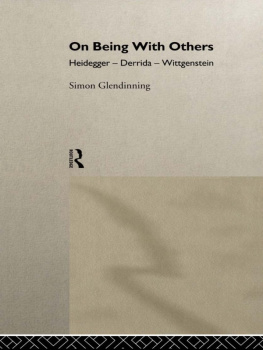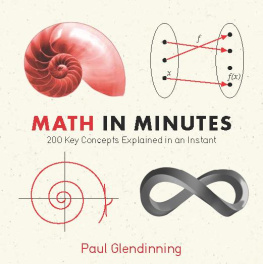SIMON GLENDINNING - On Being with Others
Here you can read online SIMON GLENDINNING - On Being with Others full text of the book (entire story) in english for free. Download pdf and epub, get meaning, cover and reviews about this ebook. year: 2011, publisher: Routledge, genre: Religion. Description of the work, (preface) as well as reviews are available. Best literature library LitArk.com created for fans of good reading and offers a wide selection of genres:
Romance novel
Science fiction
Adventure
Detective
Science
History
Home and family
Prose
Art
Politics
Computer
Non-fiction
Religion
Business
Children
Humor
Choose a favorite category and find really read worthwhile books. Enjoy immersion in the world of imagination, feel the emotions of the characters or learn something new for yourself, make an fascinating discovery.
- Book:On Being with Others
- Author:
- Publisher:Routledge
- Genre:
- Year:2011
- Rating:4 / 5
- Favourites:Add to favourites
- Your mark:
- 80
- 1
- 2
- 3
- 4
- 5
On Being with Others: summary, description and annotation
We offer to read an annotation, description, summary or preface (depends on what the author of the book "On Being with Others" wrote himself). If you haven't found the necessary information about the book — write in the comments, we will try to find it.
On Being with Others — read online for free the complete book (whole text) full work
Below is the text of the book, divided by pages. System saving the place of the last page read, allows you to conveniently read the book "On Being with Others" online for free, without having to search again every time where you left off. Put a bookmark, and you can go to the page where you finished reading at any time.
Font size:
Interval:
Bookmark:

Glendinnings is a highly original approach, one that draws responsibly from both the analytic and continental traditions to present an important alternative to the usual epistemological approach to the problem of other minds. The argument is a forceful and coherent one that not only shows the usefulness of bringing continental and analytic perspectives together on a problem of fundamental significance but also points towards avenues for future work on similar hard cases in philosophy. I enjoyed reading On Being With Others and found I learned a good deal from the authors way of posing the problem of other minds.
Steve Crowell, Rice University
On Being With Others picks an unwavering and controlled line through a mass of difficult material. It is highly thought-provoking and opens up a lot of areas of investigation. It will attract a lot of attention and generate much discussion this is the way I think that philosophy should be going. It makes Heidegger and Derrida intelligible to an analytic audience without losing their distinctive flavour; it treats analytic literature sensitively but without getting bogged down in the fine detail. I liked this book very much.
Jane Howarth, University of Lancaster
First published 1998
by Routledge
11 New Fetter Lane, London EC4P 4EE
Simultaneously published in the USA and Canada
by Routledge
29 West 35th Street, New York, NY 10001
This edition published in the Taylor & Francis e-Library, 2001.
1998 Simon Glendinning
All rights reserved. No part of this book may be reprinted or reproduced or utilised in any form or by any electronic, mechanical, or other means, now known or hereafter invented, including photocopying and recording, or in any information storage or retrieval system, without permission in writing from the publishers.
British Library Cataloguing in Publication Data
A catalogue record for this book is available from the British Library.
Library of Congress Cataloging in Publication Data
Glendinning, Simon
On Being With Others: Heidegger, Derrida, Wittgenstein / Simon Glendinning
Includes bibliographical references and index.
1. Other minds (Theory of knowledge) I. Title.
BD213.G57 1996
121.2dc21 97-24111
ISBN 0-415-17123-7 (hbk)
ISBN 0-415-17124-5 (pbk)
ISBN 0-203-00364-0 Master e-book ISBN
ISBN 0-203-17466-6 (Glassbook Format)
In 1986, I found a copy of Wittgensteins Philosophical Investigations in a box in the loft at my fathers house. My eldest brother had had enough of it, it seems. Five years later I was still reading it. For about two years after that, however, I found it hard to pick up at all, and it was in fact readings of Heideggers Being and Time and Derridas Limited Inc that rediscovered it for me. That rediscovery is what this book, in a formal way, recites.
As a result of this personal history, academic friends tell me that the central and distinctive characteristic of my work is the way in which it bridges the current gulf between analytical philosophy and Continental philosophy. I might continue: this pretty much guarantees that some readers will think my work insufficiently analytical and others insufficiently Continental. So, to take a crude example, some readers of this book might worry about the omission of detailed treatments of the standard approaches to the problem of other minds the argument from analogy and the argument from best explanation; other readers might be equally concerned that it omits detailed readings of the thought of Levinas or Merleau-Ponty. To such complaints I could simply and honestly reply that this book is not intended to present a descriptive survey of the central arguments from the analytical and/or Continental traditions. But what that answer would conceal is the fact that this work does not aim to bridge the current gulf either. Of course, given the current gulf, the fact that my work ignores it is bound to give the impression that it aims to bridge it.
I dont intend here to go into why I think the division deserves ignoring. Suffice it to say that what I have found characteristic about my work is that it only gets along at all by getting along without it. Thus, my readings of the philosophers who figure in this book are constantly, and of course I hope responsibly, informed by each other. For example, the treatment of Wittgensteinian criteria with which this book concludes develops from and out of the examination of Heidegger and Derrida which precedes it.
I think that this sheds new light on Wittgensteins position. As I have indicated, however, my first encounter with both Heidegger and Derrida was, in fact, subsequent to devouring and repeated readings of Wittgenstein. This historical ordering perhaps explains what some will consider to be an under-reading of Heideggers and perhaps especially of Derridas work. There may be some justice to this concern. I am particularly aware that my take (or at least my currently printable take) on Derridas work focuses on what one might roughly call its theoretical content its demonstrations and arguments. And I am aware that this falls short of the riches of his extraordinary writings. But perhaps this narrowness on my part can reap some unintended rewards. For my considered view is that there are at least two sorts of top-notch nonsense connected to Derridas work, nonsense for which he is not, or should not be held, personally responsible. The first appears as the upshot of partial and selective readings. Passages are cited as a badge of radicalism or of theoretical mastery. Motifs of deconstruction; the reversal and displacement of traditional binary oppositions, the aim at effective intervention, the broad notion of a text, the sometimes barely parsable sentences... all this has been pounced on like sweets from a jar. Or, perhaps, people have failed to see the jar for the sweets. This is the situation recognisable in (but not everywhere in) literary studies today. And it is faintly embarrassing. The second sort of nonsense arises as the upshot not of partial or selective reading but of simple non-reading. Here one is happy to make do with free-floating opinions, confident that deconstruction is mere bonnet-polishing, cant dressed up as serious thought. Everyone knows, it will be said, that deconstruction is charlatanry, obscure sophistry. And so everyone knows that it is not worth spending (wasting) time actually reading it. This is the situation recognisable in (but not everywhere in) English-speaking philosophy today. And, strictly speaking, it is worse than embarrassing: it is a disgrace. One of my hopes in writing the Derrida sections of this book is that I can make a contribution to setting the records straighter on the (yes, notvery- straight) paths of Derridas thought. I think some will feel that the resulting reading of Derrida is insufficiently rich. Thats almost certainly right. Full stop.
As I say, I hope I have not been unfairly unfaithful to any of the writers who enter this books embrace. But I know, too, that, quite late in the day, I found a story to tell and that it is not entirely theirs. Many people not mentioned (or not mentioned much) in this book have helped me a great deal in finding this. While they shouldnt take the blame for what I have done either, I am particularly grateful to Anita Avramides, Matthew Bell, Max de Gaynesford, John Hyman, Stephen Law, Marie McGinn, Alan Montefiore, Stephen Mulhall, Jennie Walmsley and my former colleagues at the University of Kent at Canterbury.
All of these people, and many others too, have been helpfully there at various stages and in various ways during the development of this book. I dedicate it, however, to those who were there first: my father, Nigel, my mother, Victoria, my three big brothers, Paul, Hugo and Matthew; and to the cats and dogs who were there with us too.
Font size:
Interval:
Bookmark:
Similar books «On Being with Others»
Look at similar books to On Being with Others. We have selected literature similar in name and meaning in the hope of providing readers with more options to find new, interesting, not yet read works.
Discussion, reviews of the book On Being with Others and just readers' own opinions. Leave your comments, write what you think about the work, its meaning or the main characters. Specify what exactly you liked and what you didn't like, and why you think so.








![Simon Brett [Simon Brett] - Mrs. Pargeter’s Point of Honour](/uploads/posts/book/142155/thumbs/simon-brett-simon-brett-mrs-pargeter-s-point.jpg)
![Simon Brett [Simon Brett] - Mrs. Pargeter’s Package](/uploads/posts/book/142153/thumbs/simon-brett-simon-brett-mrs-pargeter-s.jpg)

